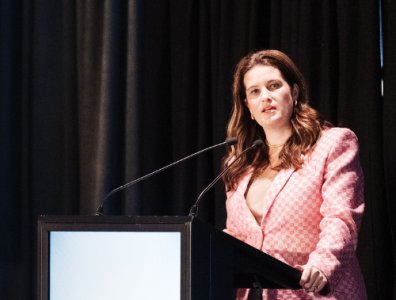Switched on to climate change at Meridian
In this supporter case study we hear from Meridian chair Mark Verbiest CFInstD about how the board is demonstrating its commitment to climate governance.
Meridian has developed a committed board of directors to confront the biggest challenge of our lifetime – climate change.
The board has demonstrated that commitment with the majority of its directors signing up as supporters of Chapter Zero New Zealand, part of the global Climate Governance Initiative.
“We have developed a committed board of directors leading an organisation where all our people are totally focused on climate change as the biggest risk we must confront,” says Meridian chair Mark Verbiest CFInstD.
“How we approach the issue could also create an opportunity for Aotearoa. For our children, and our children’s children, there is nothing that is more important.”
All directors read extensively about climate change and the company consults climate experts to inform its thinking and decision making.
“Different governance models will work for different organisations,” Verbiest says. “Look around, talk to others, and analyse and assess what may be the best strategic governance model option for you. Don’t be reticent to pick up the phone and understand what is working for others. Sharing information and initiatives will assist hugely. Share, share, share . . .”
Being a 100 per cent renewable energy company, Meridian has been able to face the challenges in a slightly more advantageous position than some of its competitors, says Verbiest.
“Clearly, climate change is a huge challenge and opportunity for us all, and we have always focused on making sure our decisions are focused on providing a better future.
“We have a huge responsibility to the Crown, all our shareholders, and to all New Zealanders to make sound financial decisions and to ensure our business remains successful for years to come.”
He says leadership, coordination and prioritisation is critical.
“We must work collaboratively and together both nationally and internationally, and across business, government and government agencies. None of us can solve the issues alone.”
Luckily, Aotearoa New Zealand has a wealth of renewable energy resources and is therefore in a unique position to play a significant role.
Verbiest says New Zealand must maximise the use of renewable energy and reduce wherever possible the need for fossil fuel alternatives.
“We know that converting transport and industrial process heating to electric are the most meaningful things we can do now to reduce our emissions and reliance on fossil fuels.”
Decarbonisation can be achieved by everyone working together and playing their part, no matter how big or small, says Verbiest.
“Our response to decarbonisation must be nuanced, sensitive, intelligent and bold. The needs and priorities of iwi, communities and customers must be assessed wisely, and our actions must work in the best interests of this country and the world.”
The New Zealand electricity market continues to incentivise the construction of new renewable electricity generation with successive governments and regulators supporting and encouraging its operation.
Verbiest says it is vital that current and future governments continue to deliver policy stability, transparency and continuity on climate change.
“The Emissions Trading Scheme, with its recent improvements and those recently proposed by government, will play a critical role in the transition to a low-emissions future. It now provides a sinking cap on total emissions and price signals to ensure businesses are incentivised to make the transition successfully.
“Complementary policies may be needed to ensure action occurs at pace in the short term, and for us priority actions would include increasing the number of EVs on our roads and increasing total renewable energy use, particularly in heating for industrial processes.
“The Government has taken some important steps in the right direction with the expansion of the GIDI Fund, the Clean Car Discount scheme, the EV exemption from Road User Charges and the Low Emissions Transport Fund. It’s also important the transition happens in an equitable and inclusive way,” he says.
Meridian generates all its energy from 100 per cent renewable sources – wind, water and sun – but “the buck doesn’t stop there”.
It is aiming to build 20 new renewable generation assets of scale by the middle of this century. That could represent investment of $10 billion in new wind and solar generation and battery technology.
With 225 EV charging points in 60 locations, Meridian is the second largest provider in New Zealand. It has another 134 charging points committed and awaiting construction.
It is also establishing EV charging products for business and residential customers to make it as simple as possible for Kiwis to drive away from fossil fuels.
“As always, we can do more,” Verbiest says. “New Zealand has a very large second-hand car market and Kiwis typically hold onto their cars for longer. While the Government’s rebate scheme is one lever, we need to look at what else we can do to incentivise people to transition to an electric vehicle and ensure there is also the supply of electric vehicles available.”
He says they are also conscious that many customers are facing significant cost-of-living increases. “While cost pressures meant we had to raise residential prices this year, we managed to keep the average price increase to around half that of the consumer price index increase across the whole economy.”
About Meridian:
Meridian owns and operates what it considers to be the jewels in the crown of Aotearoa’s hydro generation assets – the Waitaki Hydro Power Scheme and Manapōuri Power Station. From soon after it was established Meridianset its focus on being one of New Zealand’s largest generators of electricity from 100 per cent renewable sources. It continued on that journey and started developing wind farms in the early 2000s, with Te Āpiti in the Manawatu, followed by wind farms in Wellington, Raglan and Southland. Meridian is now building its sixth wind farm, Harapaki, north of Napier as well as a grid-scale battery at Ruakaka in Northland.



